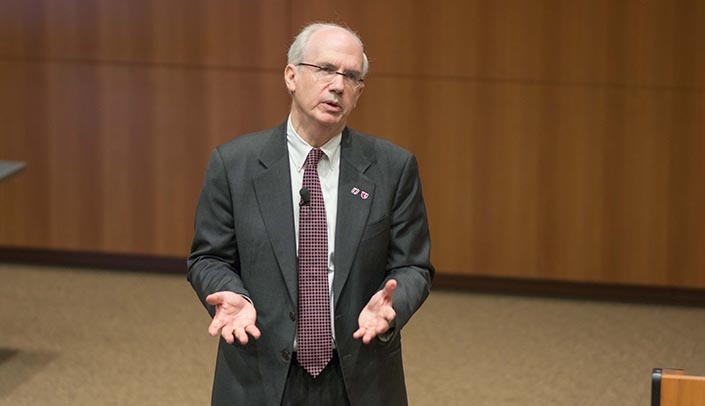The state of Nebraska’s budget shortfall is creating the need for tough decisions across the University of Nebraska system, including at UNMC, said Chancellor Jeffrey P. Gold, M.D.
During a campus forum Monday, Dr. Gold announced a list of examples of UNMC cuts and tuition changes, later doing the same at a University of Nebraska at Omaha forum.
After deploying the Budget Response Teams and taking steps to address approximately a $49 million budget shortfall in the 2017-18 and 2018-19 budgets, University of Nebraska President Hank Bounds, Ph.D., and other university leaders learned late last fall that Gov. Pete Ricketts was going to propose another 2 percent reduction this year and a 4 percent reduction in the second year of the biennial budget, resulting in approximately a $34 million gap, in addition to the previous $49 million gap.
During the forum, Dr. Gold detailed several proposed cuts that Dr. Bounds will discuss with the state legislature during Wednesday’s appropriation hearing “as examples of UNMC responses if the governor’s recommendations to the legislature to cut the budget becomes the law of the land. These are only proposals, only examples, of what might occur.”
“This is not everything — it represents approximately 50 percent of the cuts and all of the thinking about differential tuition,” Dr. Gold said. “Of course, all of the tuition proposals and many of the program changes would require review by the Board of Regents, if they were to become necessary.”
There are no proposals, however, to close any of the UNMC colleges or campuses at this time, he said. “That is not what we’re here for,” he said. “And if we close a rural campus, it would have a devastating effect on the workforce in that part of the state of Nebraska.”
The UNMC examples Dr. Bounds is planning to share, which also represent about 50 percent of possible UNMC cuts, include:
Differential tuition changes for specific programs.
- Increases in resident tuition in several of the health profession programs
- Reduction of non-resident tuition rates
Elimination of UNMC programs, degrees and concentrations:
- The Munroe-Meyer Institute’s Division of Developmental Neuroscience
- The College of Public Health’s Community-Oriented Primary Care concentration
- The College of Nursing’s gerontology clinical specialist track in the M.S.N.
- The College of Allied Health Professions’ Master of Forensic Science program.
Consolidation of College of Medicine faculty and support staff.
Consolidation of UNMC didactic offsite health profession course sites:
- Nursing (Kearney, Norfolk, Scottsbluff)
- Dental hygiene (Gering/Scottsbluff)
Elimination of UNMC research faculty, fellows and staff positions:
- College of Pharmacy (faculty, fellows and staff)
- Fred & Pamela Buffett Cancer Center/Eppley Institute (faculty)
- College of Public Health (faculty and staff)
President Bounds and the Chancellors have initiated a system-wide process to “create a clear and loud voice about the value of the university system in trying to stabilize the state budget and build a viable long term economic development strategy,” Dr. Gold said, pointing to the “education economy” — architecture, accounting, engineering, business and, of course, the health professions — which forms an important part of the state budget.
“The growth of the educational part of the economy depends upon having a great university system,” he said.
To pinpoint necessary strategies, Dr. Bounds convened university leaders and set the following guidelines:
- Meet all budget targets for FY 2017-18 and FY 2018-19.
- Not deplete more than a year of cash reserves.
- Not duplicate the elements of the BRT process.
- Create only recurring, base-budget reductions.
- In the case of tuition changes, they would have to sit on top of existing differential tuition and any overall tuition increase
In examining UNMC’s situation, Dr. Gold also mandated:
- Decisions should be driven by UNMC’s core mission.
- Seek strategic opportunities.
- Prevent long-term disruption.
- Maintain and grow the reputation of excellence across all campuses.
- Be transparent and communicate clearly.
- Balance proposals for growth and reduction.
- Connect strategic planning to the growth and reductions.
- Strengthen intercampus collaboration, particularly between UNMC and UNO.
“These decisions have to be humanistic,” Dr. Gold said. “We have to understand that 80-plus percent of the budget and this campus is people. All of these people have long-term commitments to the med center, all of these people have families and friends. We have to always think about the impact on individual human beings.”
Decisions should be data driven, he said.
“If we’re going to eliminate academic programs, we should find programs that have the smallest number of students and faculty that are impacted. If we’re going to eliminate positions, we should try to find positions that are not filled and that do not impact our core strategies for growth.”
Dr. Gold said he was hoping the cuts would prove unnecessary and that the legislature would be able to prevent all or some of these examples and more from becoming a reality.
“However, I am pragmatic enough to know that if we don’t plan, we’re not going to have the information that we need when and if we have to go forward with it,” he said.
“What concerns me is the fact that there appears to be a question about the value of higher education and academic medicine that is being tested, not just here in Nebraska, but across the nation,” he said. “UNMC is an organization that is just on an incredible trajectory of growth and quality and success, and to see anything limit the enthusiasm of that really would be very disappointing, not as much for me or you, but for the future of the communities we serve, for the future of the state of Nebraska. If we as a community do not recognize and embrace the economic impact of higher education in this state, and the role of academic medicine, we will be missing a really important concept, one that is key to our future.”
